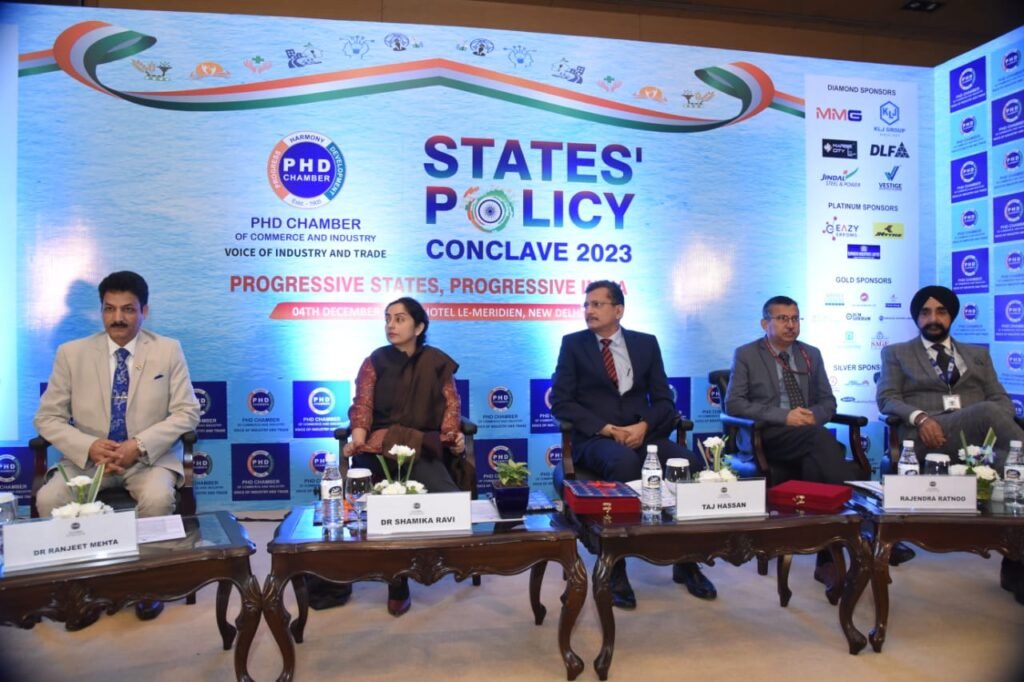 Dr Shamika Ravi, Member, Economic Advisory Council to the Prime Minister (EAC-PM) Secretary, Government of India, addressing the States’ Policy Conclave 2023 organised by PHDCCI in Delhi today, highlighted India’s remarkable growth over the past several quarters, particularly standing out amid global uncertainties.
Dr Shamika Ravi, Member, Economic Advisory Council to the Prime Minister (EAC-PM) Secretary, Government of India, addressing the States’ Policy Conclave 2023 organised by PHDCCI in Delhi today, highlighted India’s remarkable growth over the past several quarters, particularly standing out amid global uncertainties.
Emphasizing the diversity of India’s economy across its 28 states, she underscored the significance of political institutions, state policies, and the pivotal role of manufacturing. Dr. Shamika stressed the importance of a balanced economic approach, noting that a shift from agriculture to services must include a focus on manufacturing, with an emphasis on Ease of Doing Business (EODB).
She pointed out that states’ fostering business-friendly environments contribute significantly to job creation and the nation’s overall economic well-being. Addressing critical issues such as debt financing, interest burdens, administrative complexities, and long-term capital investments, Dr. Shamika affirmed the non-negotiable nature of growth for India.
She concluded her address by expressing appreciation for the PHDCCI’s Conclave centred around states, recognizing their role in driving India’s growth with progressive policies.
Shri Rajendra Ratnoo, Executive Director, National Institute of Disaster Management (NIDM), Government of India, commenced his address by expressing appreciation for PHDCCI’s role as a voice for industry and trade, particularly in addressing the concerns of MSMEs.
Discussing competitive federalism, he noted a positive shift in the ecosystem as states engaging in competitive Ease of Doing Business (EODB) witnessed growth through dynamic changes in policy and technology interfaces, facilitating smoother trade. Dr. Ratnoo highlighted the impact of timely policies like Atmanirbhar Bharat and Make in India, especially in supporting MSMEs during the pandemic.
Addressing disaster resilience, he acknowledged the focus of National Institute of Disaster Management’s (NIDM) on collaborating with states to enhance resilience at the national level. India’s proactive measures, including the establishment of a mitigation fund and a dedicated workgroup for disaster reduction, were also highlighted by Dr. Ratnoo. He further emphasized the importance of incorporating risk mitigation into business plans to safeguard investments from disasters. He urged states to formulate policies aligned with disaster preparedness to prevent adverse effects on businesses and MSMEs. Ultimately, ensuring the resilience of industry, infrastructure, and communities is crucial in adapting to evolving scenarios.
Shri Taj Hassan, Director General, Fire Services, Civil Defence & Home Guards, Government of India, stressed on the critical importance of an effective responder mechanism in the context of disaster management. He highlighted the adoption of the Fire Bill by numerous states, with approximately 5000 crore rupees allocated for fire safety measures.
Shri Hassan further underscored the need for states to enhance the implementation of these measures, emphasizing the gaps in digitization and automation that many states still face. He stressed the importance of augmenting all aspects of fire safety and ensuring compliance with the National Building Code.
Appreciating the significance of both the National Disaster Response Force (NDRF) and the State Disaster Response Force (SDRF), he pointed out that the SDRF, with its knowledge of local topography, is equally crucial. He further concluded, by urging states to actively adopt the proposed bill to strengthen disaster response capabilities.
Mr. DPS Kharbanda, CEO, Invest Punjab, said, Invest Punjab is an end-to-end online system providing timely statutory approvals with efficient feedback mechanisms. Recognized as India’s top-performing investment promotion agency by the Government of India, it excels in facilitating investment. He added conclaves like this offer a unique platform for investors, businessmen, bureaucrats, and the industry to engage in meaningful discussions on crucial matters. Over the past one and a half years, Punjab has attracted substantial investments totalling around 58 thousand crores, providing significant business and employment prospects, particularly for the youth.
Dr Ranjeet Mehta, Executive Director, PHDCCI, emphasized how within the federal structure of India, states play a crucial role as significant partners in achieving the 5 trillion-dollar goal for India’s economy. Recognized as engines of growth, states are primary hubs for industrialization. While major cities like Bengaluru, Maharashtra, and Delhi house around 100 thousand startups, progressing these startups to tier 2 and 3 cities is essential for India’s overall advancement.
As India aspires to become a 2 trillion-dollar exports economy by 2030, a recent report by PHDCCI identifies 75 products mapped from various districts. He added, the goal includes diversifying into untapped markets with significant potential, aiming to reach this economic milestone.
Further, the conclave also witnessed unveiling of the research report titled ‘Progressive States, Progressive India,’ offering valuable insights into the pivotal role of states in driving India’s economic advancement. The Conclave also hosted sessions on international and state outreach besides a panel discussion. Among others, the Sessions were addressed by Amb Dr Shankar Prasad Sharma, Ambassador of Nepal to India; Amb K V Rajan, Secretary (retired), MEA, GoI; Mr. Prem Shankar Jha, Veteran Journalist & International Affairs Commentator; Mr. Dushyant Thakor, Deputy Executive Director, WAIPA; Mr. Ajay Mishra, Resident Commissioner, Government of Uttarakhand; Mr. Devesh Deval, Resident Commissioner, Government of Manipur.